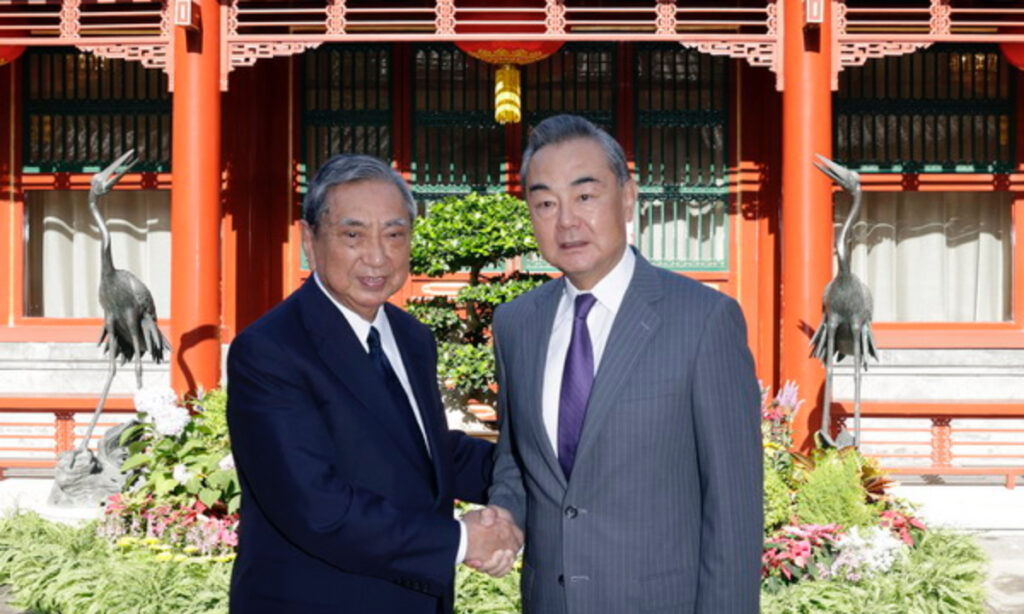Bilateral relations between China and Japan should remain undisturbed by external distractions, and the two countries should jointly safeguard the hard-won peace and stability in Asia, said Chinese senior diplomat Wang Yi when meeting with Yohei Kono, president of the Japanese Association for the Promotion of International Trade (JAPIT), in Beijing on Thursday.
The meeting between Wang, director of the Office of the Foreign Affairs Commission of the Communist Party of China (CPC) Central Committee, and Kono took place in Beijing a month ahead of the 45th anniversary of the signing of the China-Japan Treaty of Peace and Friendship. Referring to the anniversary, Wang said that the bilateral relations are at a new crucial juncture.
Speaking of the China-Japan relations, Wang quoted an old saying in China that calls for upholding fundamental principles and breaking new ground.
“For China-Japan relations, upholding fundamental principles means adhering to the principles set out in the four political documents between China and Japan, consolidating the political foundation for the sound development of bilateral relations, taking history as a mirror, looking into the future, and sticking to the path of peaceful development,” said Wang.
On the other hand, Wang pointed out that the bilateral relations should break new ground, which means to meet the requirements of the new era based on fundamental principles, remain undisturbed by external distractions, implement the political consensus that China and Japan are cooperative partners rather than threats to each other, and jointly safeguard the hard-won peace and stability in Asia.
There has been a series of negative movements from Japan regarding the Taiwan question in recent years, Wang stressed.
Some people even advocated that “a Taiwan emergency is a Japanese emergency,” which is absurd and dangerous, and all sectors in Japan should be highly alert, he warned.
Wang also expressed the hope that Kono and the JAPIT will strengthen confidence in cooperation, oppose “decoupling economies or severing supply chains,” and make new contributions to the improvement and development of China-Japan relations, the Xinhua News Agency reported on Thursday.
Kono said that decoupling economies or severing supply chains is in the interests of no one.
China-Japan relations have come a long way and cooperation has brought benefits to both sides, he said, noting that the business community does not agree with the politicization of economic issues.
Kono hailed China’s development momentum and vitality, saying the two sides should make joint efforts to improve and promote the bilateral relations and cooperation in Asia.
Kono led a delegation to China for a visit from Monday, the first in four years, with the entourage consisting of more than 80 members including Okinawa Governor Denny Tamaki and representatives of Japanese companies, which experts noted represented the Japanese business community’s wish to maintain and strengthen economic and trade ties with China.
However, there have been some worrying factors in the current Japanese government’s China policy, as a series of negative diplomatic, military and economic moves by Japan have given China reasons to be concerned about possible regressions in the section. Experts said that it is utterly unwise for Japan to blindly follow the heels of the US and ruin the normal economic relations with China.
Earlier in June, the latest trilateral meeting of senior security advisors from the US, Japan and South Korea showed an alarming trend of interfering with China’s domestic affairs and inciting confrontations with small cliques by hyping “China threat” theory on the South China Sea and the Taiwan question, analysts said.
Wang said on Monday during 2023 International Forum for Trilateral Cooperation involving China, Japan, and South Korea, that in recent years, individual extraterritorial powers have deliberately exaggerated ideological differences for their geopolitical self-interest, and have been creating various exclusive coteries, trying to replace cooperation with confrontation and unity with division.
(Global Times)




